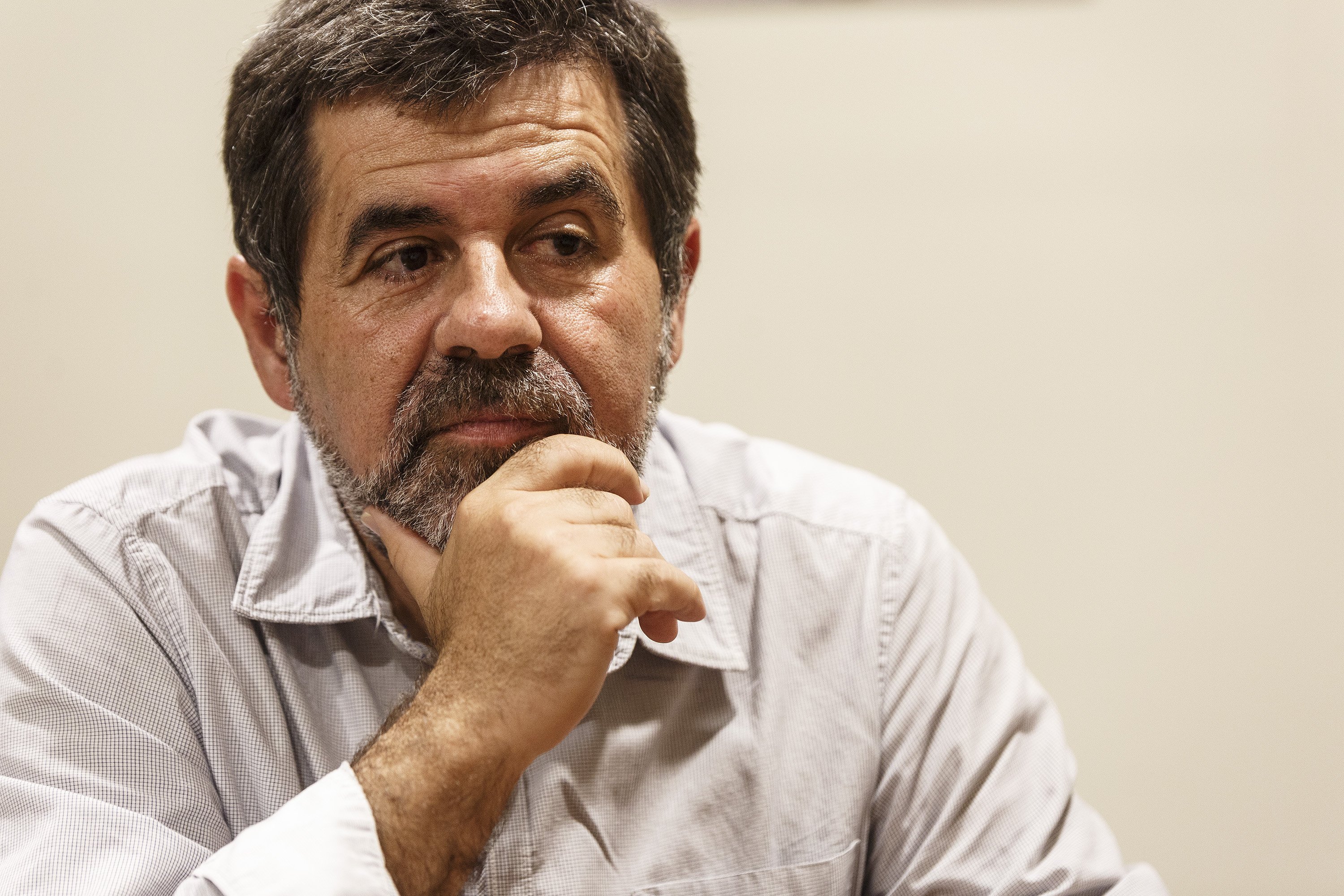The independence movement is called to the streets for one more "Diada", one more Catalan National Day this Monday, 11th September. This time, the gathering place will be the centre of Barcelona. The plan, to create a huge plus sign at the crossroads of major thoroughfares passeig de Gràcia and carrer d'Aragó. The challenge is to maintain the same level of turnout after so many years of rallies. In the past, depending on the source of the statistics, participation has reached or even well exceeded 1 million people. The organisers' aim is for this year to be the definitive protest ahead of the 1st October independence referendum, prompting the name "the Diada of the yes [vote]".
The president of the Assamblea Nacional Catalana (ANC, Catalan National Assembly), which has spearheaded the organisation of the Diada rallies, Jordi Sànchez, received El Nacional at the end of a very intense week in the Catalan Parliament. The chamber has prepared the basis for the upcoming referendum and for a potential "yes" victory. Now all that's needed is the ballot boxes and for no one to take them away.
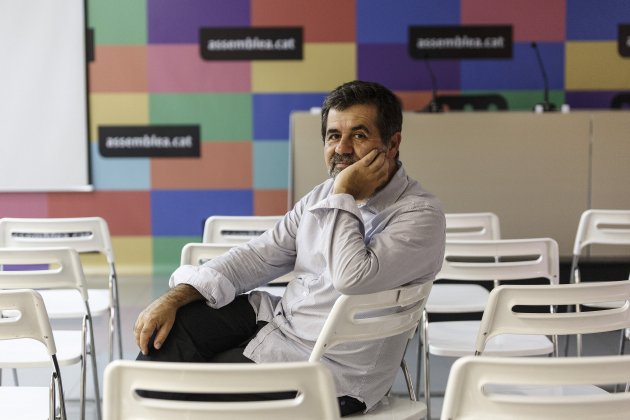
What do you hope for this Diada?
It will probably be the Diada that we've had the most reasons to take happily to the street. We head out already called to vote [on 1st October], and that gives the public a spectacular starring roll. We're convinced that the people will rise to the moment. The referendum now doesn't depend on the government; it depends on the public. Now it's time for us to put our votes in the ballot boxes.
Were the laws passed this week essential for 11th September?
For 1st October, yes. It had to be this way, with a law passed by the Catalan Parliament. We would all have wanted different conditions. The judiciary, the Spanish government (which urged this aggression towards the Parliament) haven't left any other option than a process which is legitimate, but not the ideal one.
Maybe the spectacle has been unedifying.
It has been [unedifying], but not for the use of [article] 81.3 [of the Catalan Parliament's rules, see note below]. It's been unedifying because the opposition hasn't wanted to accept it. If there hasn't been a joint . We still see clearly the image of the three opposition leaders at the doors of the Constitutional Court for them to limit the parliamentary debate. There's still time for them to raise their voices in support of the members of the Parliament's Board who have had to testify for the supposed crime of facilitating a parliamentary debate. Those who didn't want the debate were Ciutadans (Citizens), PSC (Socialists' Party of Catalonia) and PP (Popular Party) with two great allies: the Constitutional Court and Spanish government.
Translator's note: Article 81.3 of the Catalan Parliament's rules allows bills to bypass the normal parliamentary process and be accepted for consideration and passed in the same day. This meant the proposed laws could be voted on and approved before the Constitutional Court could challenge them.
Has it been a break with Spanish law prior to independence?
It's been a great act of sovereignty by the Parliament. Today we, the democrats of Catalonia, feel ourselves as having been summoned [to vote] by a law passed by the Parliament. If the Constitutional Court hasn't used the prerogative it was give to suspend public officials, it's not for lack of wanting to. It's because they know that that suspension would have no effect. They've lost their authority over the Catalan authorities. The Referendum Law sets the Parliament up to make itself a sovereign political entity.
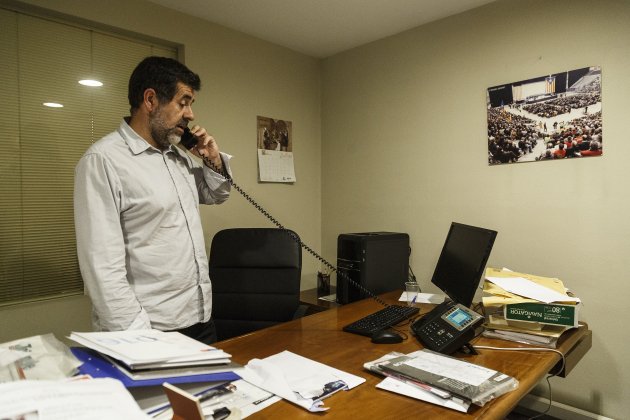
Constitutional Court rulings will keep coming...
We have to read them, file them and carry on. At this time, the Constitutional Court does not have the recognition or the legitimacy that it had had. The Constitutional Court cannot stop the functioning of the country's institutions by itself alone. Only the use of the force could stop the referendum. No suspension will stop the referendum. Because we do not recognise them as legitimate. It's a great act of sovereignty. But it's not to declare independence: it's to give the public a voice for them to freely express [their wish].
Do you believe that the Spanish state will intervene in the Catalan government or suspend Catalonia's autonomy?
The [Spanish] state can end up going crazy. But if we have a referendum today it's down to the political uselessness of the PP and PSOE (Spanish Socialist Workers' Party) governments. It's down to that image of PP leaders presenting signatures in the Spanish Congress against the Statute [of Autonomy, see note below]. It's down to the PP being able to avoid the Parliament of Catalonia going ahead in the direction it was taking. This same ineffectiveness from the PP has meant the State has ended up without the means, outside of the use of force, to stop the referendum.
Translator's note: Changes to Catalonia's Statute of Autonomy, dating from the transition to democracy after the Franco dictatorship, were approved in a 2006 referendum. These changes, which would have given the Catalan government slightly broader powers, were eventually struck down by the Constitutional Court in 2010. This ruling was one of the factors that led to the current upsurge in pro-independence feelings.
The PP... has ended up without the means, outside of the use of force, to stop the referendum
Do you not believe Xavier García Albiol's threats about applying article 155 of the Spanish Constitution (see note below)?
Let them apply it. A first-year student of Law or Political Science knows that political power rests on two pillars: legitimacy and the use of force. If a state or governor has legitimacy, they don't need to use force. But the state has lost its legitimacy. Therefore, the only way to stop the will of the Parliament of Catalonia is the use of force.
The suspension will only become effective if they use the Civil Guard to block all the Catalan government's ministries. Is the Spanish government prepared to do that? Is it easier to post the Civil Guard all around the country, to threaten the whole population, than to sit down at a table and negotiate the opening of polling stations? They've completely lost their way.
Translator's note: Xavier García Albiol is the leader of the Catalonia branch of the PP. Article 155 of the Spanish Constitution gives the central government broad powers to use the "necessary measures" against rebellious autonomous communities.
Do you not envision the Mossos d'Esquadra, the Catalan police, removing the ballot boxes?
I don't envision them taking away ballot boxes, no.
There is another way: threatening the assets of high-ranking officials, as the Court of Accounts showed this week. Do you worry that this might prove effective?
It could be. But the people who have been directly threatened are mature and generous. The society is generous too, it is responding and will respond on a large-scale to the donation campaign. That will make everyone go ahead in the same direction. When the state is faced by two, three or ten leaders, it's able to win. But not when it has 700 mayors, 7000 local councillors and hundreds of thousands of people ready to defend democracy. It will be demonstrated again this Diada. Facing that, there's no Civil Guard, nor Constitutional Court, nor Court of Accounts, nor Public Prosecutor who can stop us.
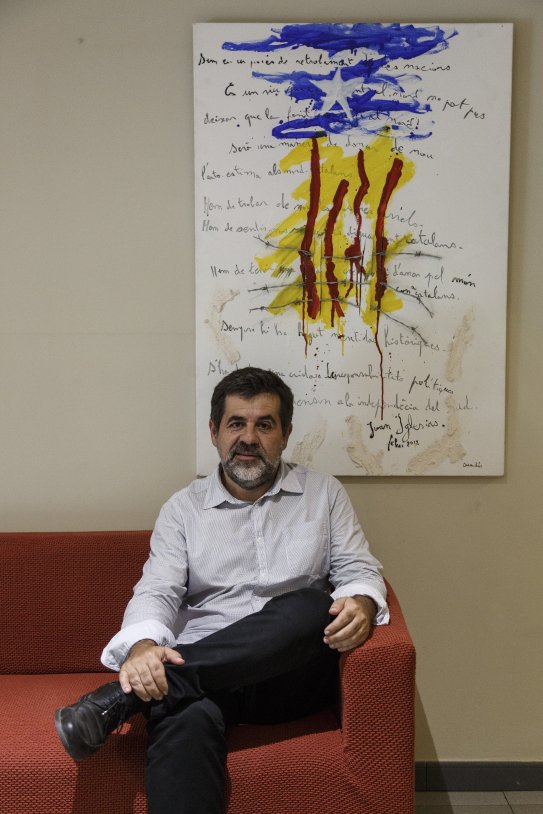
Given the success of the donation campaign, could this initiative be expanded?
This is a permanent campaign. It's the donation campaign for democracy, it's the campaign to win. When it falls upon one of us, it falls upon all of us. Solidarity is the most basic revolutionary tool. In 48 hours we'd raised 800,000 euros. That shows us that the people are perfectly aware that currently being part of a very big team is the only way that gives us the option to be the winning horse.
It can be said that the Spanish state has kept a fairly low profile so far, possibly because we're still before the 11th September. Do you expect the attacks to intensify from now on?
Very probably. For two reasons: because it knows it cannot stop the referendum (nor does it know how to) and because it knows that depending on what action it takes it can mean an acceleration of the people's indignation. Ahead of an 11th September, it's probable there's an order of maximum prudence. And it's probable that, as we get closer to 1st October and the state sees all its attempts to stop it fail, their actions move up a notch. There could be searches of private residents of leaders of the independence process. But they won't scare us, because we have nothing to hide.
Facing a disproportionate answer from the state, could the law of Transitional Jurisprudence come into force before 1st October?
It's a scenario that will have to be considered. Our demand of [Catalan president Carles] Puigdemont's government is that the referendum be the first priority. In fact, we have no other priority.
There could be searches of private residents of leaders of the independence process. But they won't scare us, because we have nothing to hide
And if it's blocked by force?
If the referendum is blocked by force, a decision will have to be taken. We'll hold a referendum that's not been negotiated with the state because the state hasn't wanted to negotiate. In the same way, we also say that, if the state reaches its objective by force, it will be legitimate for the legally constituted majority in the Parliament to proclaim the birth of a new country. The option will be on the table.
Then you would be in favour of proclaiming independence if it's blocked by force?
When the state uses disproportionate pressure, we cannot just stand there with our arms folded. We will have to be astute and prudent, but, as Puigdemont and [vice-president Oriol] Junqueras said, there will only be Catalan elections if the referendum happens and "no" wins. If the state prevents [the referendum], there won't be Catalan elections called by the current president nor by the Government either.
To stop the referendum, the state will have to blow up the Catalan institutional system. Most likely Mr. Rajoy has all the legal reports about how to apply articles 155 and 166 (for states of alarm, emergency and siege) [of the Spanish Constitution] and the Law of National Security. But what they won't know is how to get out of the mess, the conflict they've created.
The pro-independence organisations have also been under the spotlight. Do you fear that they might also go for you?
We're not scared of anything, because there's nothing to hide. We're very clear: from the very start we've said that we were created to carry this country to independence. We've always acted within the law. We have one red line: respect for democracy and, as such, a direct rejection of violence. Once cut off from violence as a political factor, defending ideas shouldn't be a crime. We have nothing to fear, but it's probably that they'll want to reduce our influence.
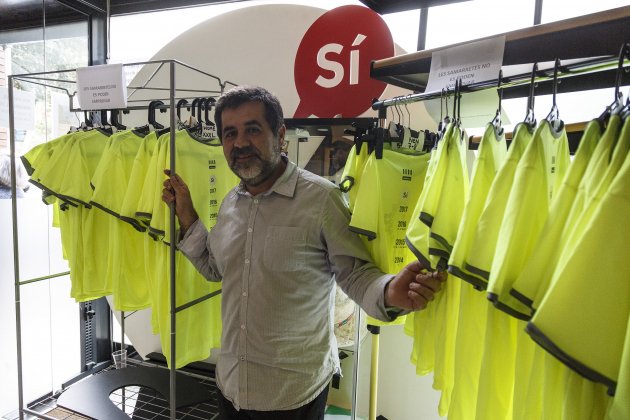
Recently you've seen yourselves obliged to deny that the terrorist who attacked the Rambla in Barcelona in August was a volunteer for the referendum.
A lot of nonsense and lies have been said. But we shouldn't lose our sense of humour nor the ability to get angry. A sense of humour is very important because, when we get angry, we can keep stick to our principles. In this specific case, it was little more than black humour. In the face of the immorality that some media outlets have made their profession, we have to maintain common sense. We won't fall to provocations, although that will go further.
They've also accused you of instigating a boycott of the anti-terrorism protest. Is there a strategy of criminalisation?
Absolutely. I invite any reader of El Nacional to look at its reports from 17th August [the day of the attacks], around 6:30pm, and they'll find media, political leaders and renowned journalists turning their actions towards counteracting 1st October. It's unacceptable.
Have you seen the ballot boxes?
We haven't seen them. We don't need to see them, because we believe the president of Catalonia when he says that there are urns. It's not a question of faith, but of confidence. We trust the president and the government of this country, the 72-deputy majority.
We haven't seen [the ballot boxes, but] we don't need to see them, because we believe the president when he says that there are urns
You've not seen the electoral roll either?
We haven't seen that either. But we're certain that the government has it.
What makes you think that the government has everything ready?
The calmness with which they're acting. I believe that the only worry is for things to happen neatly. Currently, the pressure is because they know that the state is using all its means to scare, to slow the efficiency of the Catalan administration. But the Catalan local councils will respond. Barcelona's too. The worry is to guarantee that it's a day with a large turnout.
There are important town councils in the country, like those of L'Hospitalet de Llobregat, Lleida and Tarragona, that have already said they won't collaborate. What should be done about that?
In the first place, ask the mayors of these places who they are to stop their residents from expressing [their opinions] under a valid law. It's an excess of authoritarianism. In second place, the Catalan government has to guarantee that there are alternative spaces for the public to exercise their right to vote.
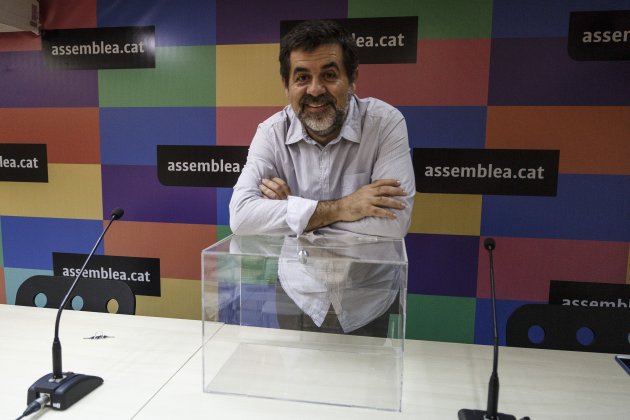
In the 1st October referendum are civil servants put at risk, as some local councils argue?
No. As a matter of fact, the only institution that puts them at risk is the Court of Accounts, which is persecuting civil servants that weren't called for criminal proceedings. The ones responsible were the democratically elected political leaders. Not even the local council secretaries have responsibilities. And in no election are the people responsible for guaranteeing its working civil servants.
But the Spanish Government has already sent them warning letters.
Because the Spanish Government has to dramatise, to gesticulate, to scare, to threaten. It has to create a smokescreen that makes it seem we're heading for the end of the world. The problem is that the Spanish Government is not sufficiently aware that its credibility is very reduced. It's the same government that told us there wouldn't be a 9-N [unofficial referendum in 2014]. It's the same government that said that the Parliament would never pass a Referendum law. This government, with the help of PSOE, Ciutadans and some of the media, has created a false narrative to try to win the collective imagination. And they've ended up believing it. They're confusing their wishes with reality.
Don't positions like those held by Podem Catalunya [Catalan branch of Podemos, We Can], who call people to take part as a demonstration, but not as a binding referendum, contribute to devaluing 1st October?
No, I respect all political positions. Any political party or person has the right to position themselves before the referendum as they see fit. Including those who say that you shouldn't go to vote, like [Joan] Coscubiela [spokesperson for CSQP, Catalonia Yes We Can], although I believe that it's a mistake. What I don't accept is those political leaders with responsibilities that impose certain positions on the citizens beyond their ideas.
[The Spanish] government, with the help of PSOE, Ciutadans and some of the media, has created a false narrative... and they've ended up believing it
The "no"-supporting parties are running a more or less active campaign to boycott the vote. What will happen if, like in 2014, they don't feel asked to vote?
They won't vote, that will happen. If they could mobilise a large proportion of their support they could win. They have to know that if they pay attention to the parties who support "no" and aren't going to vote, the next day they won't be able to claim that they told them to not go to vote. The question to the leaders of these parties is how will you look your voters in the eyes if, on 1st October, "no" gets an insufficient result giving the victory to "yes"? Currently, the people guaranteeing the freedom expression of the "no" side are those of us defending the referendum.
Let's accept the premise that there shouldn't be a minimum turnout established, following the recommendations of the Venice Commission. But, if the turnout is the same as or less than 2014, would it be legitimate for the Catalan government to apply the result?
There are many variables in play. We have to work for a large turnout. Everyone will evaluate the legitimacy of applying the result depending on how 1st October ends up developing. 1.8 millions "yes" votes would represent, in the scenario that turnout is 65%, more than 55%. Unfortunately, there's an operation in progress trying to orchestrate the abstention. Someone needing to hide behind abstention is doing badly. They probably know they're losing.
At least it will be an unprecedented vote, with only one option campaigning...
I would not be so categorical.
Do you believe that someone will run a "no" campaign?
It would be preferable. I know that it's not easy, because, among other reasons, some "no" supporters feel very pressured in an environment that others are clearly pushing for there to be no campaign. But I believe that in the end voices arguing in favour of "no" will end up emerging. It would be an example of dignity and independence of those parties, which would deserve all our respect.
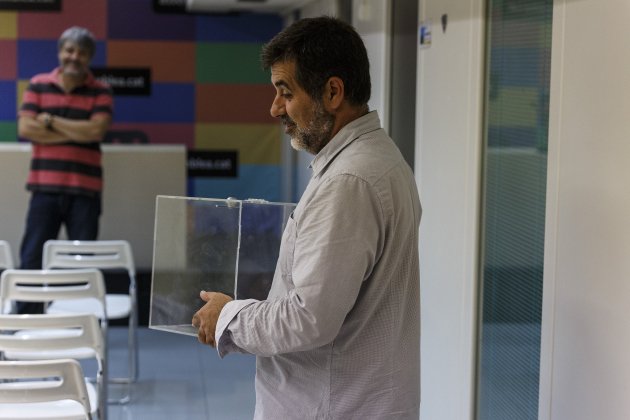
Will the government have the strength to apply the result?
It could have it if the social support behind it holds.
Is it given strength by votes?
Votes and the later commitment of the people to be mobilised. Undoubtedly, the principal source of inspiration for the strength, in a democratic situation, comes from the votes. If there are votes, there's legitimacy and there's strength to be able to settle the results. Our strength isn't physical, but the strength of the people. It's what have brought us to this point.
You talk about the people's commitment to be mobilised. I don't know if it's true, but it's been reported that the ANC has considered occupying infrastructure...
It's been reported, but it's not true. We're working based on the conviction that, sooner or later, democratic reason and the strength of democracy will cause the injustice of those who don't want anything to be changed to collapse under its own weight. But it's also true that we've said that, if the moment arrives that the state goes mad and uses force, we will give a civil and peaceful response. But a response that makes the abuses clear.
We've imagined demonstrations with a continuous presence in the street [after 1st October]
And what is this response?
The response will be demonstrations that are still being sketched out, which we'll probably not have finalised until the day arrives. We're little in favour of demonstrations that alter normality. But we're fervent supporters of considering any type of demonstration and carrying out a large demonstration, like a continuous presence in the streets of the capital, in a happy and festive tone. If the ANC has demonstrated one thing it's creativity. If anyone thinks that on 2nd October, chaos and violence will come, they're mistaken. We're not part of that world.
But have occupations of infrastructure been contemplated?
No, with that detail, not.
And campouts?
We've imagined demonstrations with a continuous presence in the street, yes. Protesting is a legitimate right, protected by all the international agreements and conventions. And there are other types of protest, different to the Diada. The only red line is violence.
Is there no fatigue of so much mobilisation?
They say that. Let's talk about it tomorrow. Many people say it, and sometimes I think so too. But the facts are very stubborn. Every Diada they say that it will be worse. Last year was meant to be a disaster and we filled five cities, including hundreds of thousands of people in Barcelona. We'd like to leave the estelada [the "starred" pro-independence flag] in the drawer and stop buying t-shirts, but, if we have to take it out and buy them, we'll do it as many times as possible.
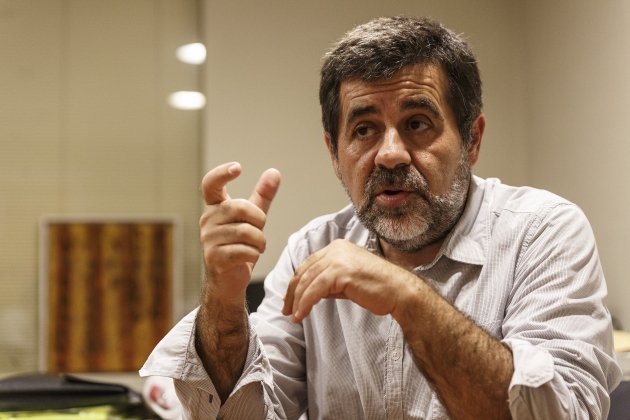
You're talking about demonstrations after 1st October. This week CUP has called for demonstrations until that day. You're considering it, right?
No. If there's no need to, no. In the same way that on Wednesday and Thursday we didn't gather in front the Parliament, at an especially important time [while they were passing the referendum and disconnection laws], nor will we do so after the Diada. If it's necessary, we'll be where, when and how we have to be. But, if it's not necessary, we won't gather anyone, because it doesn't achieve anything. There's no need to tire and stress people.
But they will take part in the "yes" campaign.
We're coordinating it. The great, unified "yes" campaign is led by the ANC. And there will be a basic coordination between the pro-independence organisations with three great events. The first will be in Tarragone on 14th September. The other two we will announce when the time is right.
Can you guarantee that, this time, it's the definitive Diada?
There's nothing I want more. But the people who know me well know that I will never claim anything that's not in my hands. It's in the hands of all the people of this country for this to be the final pro-independence Diada, but it will mean that the Catalan republic has been born. If we're there tomorrow [for the Diada] and on 1st October, and we don't give out, my wish will probably come true very soon.

